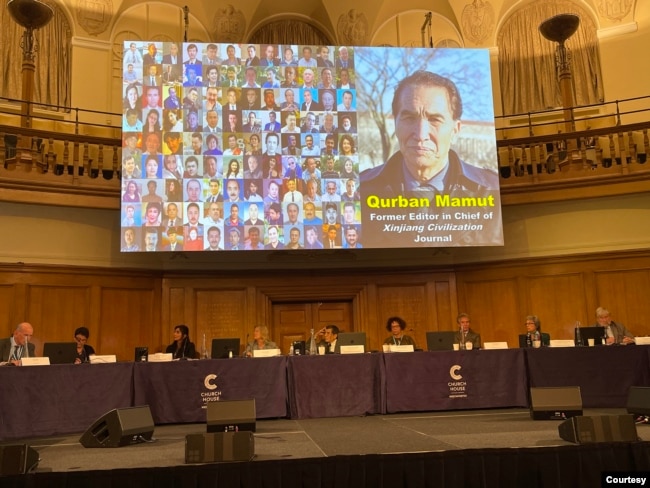A group of U.S. House lawmakers introduced a resolution on Tuesday, World Press Freedom Day, which named countries including China, Russia and Belarus as nations that committed “repressive and brutal actions” against journalists.
China is “one of the worst media environments in the world and seeks to curtail political speech inside and outside the country…,” stated the resolution, citing the Committee to Protect Journalists’ 2021 findings.
Bahram Sintash, a Uyghur American, said his father is one of the journalists detained in China.
“The U.S. government should speak up for many Uyghur journalists like my father who are arbitrarily detained and imprisoned by the Chinese authorities,” Sintash, who lives in Virginia, told VOA.
Sintash lost contact with his father, Qurban Mamut, who was the former chief editor of the China-controlled Uyghur journal Xinjiang Civilization, more than four years ago.
Then earlier this year, Sintash learned that his father was taken by Chinese authorities from his residence in Urumqi, the capital of Xinjiang in northwest China.
“In February, I received an indirect message from my sister in Urumqi that our father, Qurban Mamut, was sentenced to 15 years in prison,” Sintash said.
Fifty journalists are imprisoned in China, according to CPJ’s 2021 report released last December.
Twenty-two of them are Uyghur journalists from Xinjiang, who make up 44% of the incarcerated journalists in China and 7.5% of the 293 jailed journalists worldwide in 2021.
Peter Irwin, the senior program officer for advocacy and communications at the Washington-based Uyghur Human Rights Project, told VOA that China has for many years targeted Uyghur journalists.
“In many ways, (Uyghur) journalists were among the earliest targets for suppression and imprisonment by the Chinese government,” Irwin said.
Rights groups and some countries, including the U.S., have accused China of mistreating Uyghurs, including subjecting more than 1 million Uyghurs to mass internment for “reeducation,” forced sterilization and labor or those either in and out of detention since late 2016.
The U.S. government officially designated China’s treatment of Uyghurs as genocide in January 2021.
Beijing calls the accusations “lies,” saying that “the local people are living a safe and happy life” in Xinjiang.
CPJ’s list of China’s jailed journalists show that half of the 22 Uyghur journalists were arrested after 2016, and the rest were jailed from 2009 to 2014.
According to Irwin, before 2015, Uyghur journalists who wrote independently or moderated blogs or other publications were targeted for their work.
“After 2015 or so, you see a heightened attention to Uyghur journalists who tried their best to follow the arbitrary rules set out by the government and still couldn’t avoid imprisonment,” Irwin said.
Nine of the 22 imprisoned Uyghur journalists worked for an independent website called Uyghurbiz, which was co-founded by Ilham Tohti, a former Uyghur economics professor at Minzu University of China in Beijing.
According to CPJ’s report, Tohti was sentenced to life in prison on charges of “separatism” in September 2014.
Jewher Ilham, a Washington-based Uyghur rights activist and Tohti’s daughter, told VOA that some of the Uyghur journalists who used to work for her father’s website had not been released from prison after they had finished their sentence.
“Even though some of them should have been released by 2019 or 2020, they still remain in prison,” she said.
According to Jewher Ilham, Chinese authorities repressed not only Uyghur journalists but also any Uyghur who tried to save or circulate uncensored news content.
“My cousin was sentenced for 10 years in prison for refusing to hand in her phone at a checkpoint and saving a picture of my father and the text of his article,” Jewher Ilham told VOA.
‘Tip of the iceberg’
Abduweli Ayup, founder of Uyghur Hjelp, a Norway-based organization that documents China’s Uyghur rights violations, said the CPJ’s findings are just “the tip of the iceberg.” His organization found 40 Uyghur journalists who were jailed in China in recent years.
“In our data, there are at least 40 imprisoned Uyghur journalists among over 400 Uyghur intellectuals incarcerated by Chinese authorities,” Ayup told VOA. “If we include Uyghur website bloggers and government radio and TV hosts to our list, the number of jailed Uyghur journalists is at least over a hundred.”
Ayup said that the 22 imprisoned Uyghur journalists in CPJ’s report are only the ones confirmed by media.
“(There are) still many more imprisoned Uyghur journalists yet to be confirmed by media and added to the CPJ’s list of imprisoned journalists,” Ayup said adding that the CPJ’s number of imprisoned Uyghur journalists will be 23 if Qurban Mamut is included.












